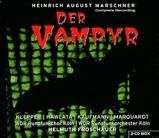|
|
|
|
|
|
|
|
| OPERA NEWS, February 2002 |
| FRED COHN |
|
Marschner: Der Vampyr
|
|
| Klepper, Hoffman; Kaufmann, Hawlata,
Marquardt; Orchestra and Chorus of the WDR Rundfunk, Köln, Froschauer. Text.
Capriccio 60083 (2) |
|
 Heinrich
Marschner's 1828 Der Vampyr is little performed today, but the singspiel was
a hit in its day, and this recording makes the reasons clear. Not the least
of its fascination is its plot: in order to live among humans for another
year, the vampire Ruthven must claim three brides as victims before the
stroke of midnight. It could serve as the scenario for a Hammer Films
shocker. Heinrich
Marschner's 1828 Der Vampyr is little performed today, but the singspiel was
a hit in its day, and this recording makes the reasons clear. Not the least
of its fascination is its plot: in order to live among humans for another
year, the vampire Ruthven must claim three brides as victims before the
stroke of midnight. It could serve as the scenario for a Hammer Films
shocker.
Marschner depicts the horrific using a musical vocabulary that will be
familiar to any moviegoer. The overture's first phrases use descending minor
scales that not only echo the Stone Guest music in Don Giovanni, but
anticipate the horror-movie scores of a hundred years later. With its
mixture of supernatural and folk elements, Vampyr most recalls Der
Freischütz, composed seven years earlier. It never achieves the
phantasmagoric intensity of Weber's Wolf Glen scene, staying more securely
tethered to singspiel convention, but it remains tuneful and well crafted
from the first note to the last.
Franz Hawlata takes the title role. He's billed as a baritone here, but he
has sung Ochs at the Met, and his voice is notably darker than that of
Markus Marquardt, the recording's nominal bass. Hawlata is at his best when
the music calls for demonic vehemence; when he has to convey oily, Don
Giovanni-esque seductiveness, the vocal line often lies uncomfortably high,
and the singing isn't ideally even.
Regina Klepper, as Ruthven's intended bride Malwine, has a penetrating
soprano that probably carries well in the theater; as recorded, though, the
voice is impossibly edgy. Soprano Anke Hoffman, in the dual role of
Ruthven's victims Janthe and Emmy, has a lighter voice, only marginally less
strident. The vocal honors of the set belong to Jonas Kaufmann as the
vampire's foil, Aubry. His compact, well-knit tenor provides consistent
pleasure. Helmuth Froschauer leads a trim, fleet performance that
emphasizes the opera's classical foundations over its premonitions of
Wagner.
The recording suffers from a lack of theatricality. It includes none of the
singspiel dialogue and no sound effects, so that an Act I melodrama becomes
purely an orchestral interlude. Marschner called for a comic quintet in Act
II to end with a gunshot, plunging the action back into the realm of the
horrific, but here there's no sound, just a pause before the next number.
The libretto is in German, and it includes only the musical numbers. |
|
|
|
|
|
|
|
|
|
|
|
|
|
|
|
|
|